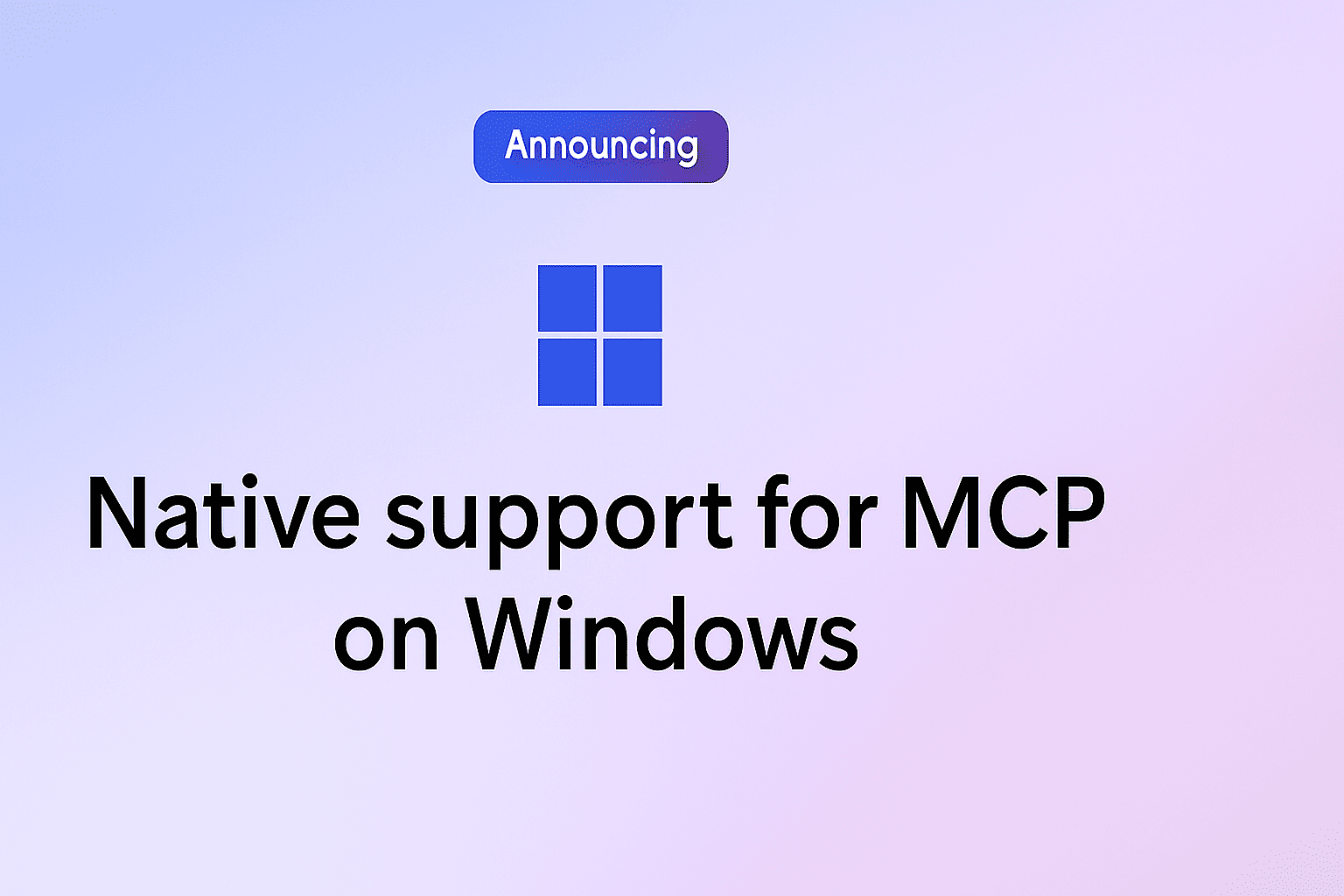Breaking News: Windows 11 Embraces Native MCP Server Support, Redefining AI Integration
Seattle, WA – May 19, 2025 – At Microsoft Build 2025, Microsoft dropped a game-changing announcement: Windows 11 now natively supports Model Context Protocol (MCP) server environments, setting the stage for a new era of agentic AI on the world’s most popular desktop operating system. This move, described as a “pivotal step toward an agentic OS,” promises to make AI agents smarter, more connected, and seamlessly integrated with Windows apps and services. From students to developers to businesses, this update is poised to transform how we work, learn, and innovate. Here’s everything you need to know about this groundbreaking development!
What is the Model Context Protocol (MCP)?
Imagine a universal plug that lets AI “talk” to any app, tool, or system without a fuss. That’s the Model Context Protocol (MCP), an open-source standard introduced by Anthropic in late 2024. Often called the “USB-C of AI apps,” MCP is a lightweight protocol (based on JSON-RPC over HTTP) that allows AI agents to:
Discover Tools: Find and connect to apps, files, or services like GitHub, Figma, or even Windows itself.
Perform Actions: Execute tasks like creating files, managing code repositories, or querying data.
Share Context: Maintain memory across tasks, making AI interactions smoother and more intuitive.
With MCP, AI agents move beyond just answering questions to taking actions—think scheduling a meeting in Zoom, generating a chart in Excel, or pulling data from a database, all from a single prompt. Microsoft’s integration of MCP into Windows 11 makes the OS a hub for these smart, autonomous AI agents.
How Does MCP Work in Windows 11?
Microsoft is embedding MCP support into Windows 11 through two key components, making it easier for AI to interact with the OS and third-party apps:
MCP Registry: Think of this as a secure directory where AI agents can find trusted MCP servers. It’s like an app store for AI tools, ensuring only vetted, secure servers are accessible. Developers can publish their app’s capabilities here, so AI agents know what they can do.
MCP Servers: These are lightweight services that expose specific functions, like accessing the Windows File System, managing windows, or interacting with the Windows Subsystem for Linux (WSL). Windows itself acts as an MCP server, letting AI agents tap into core OS features.
For example, you could say, “Find my project files and summarize them in a Word doc,” and an AI agent using MCP could search your File System, extract the files, and create the document—all without you lifting a finger. This integration is currently in a private developer preview with select partners, with a public release planned after feedback.
Why This is a Big Deal?
This isn’t just a techy update—it’s a leap toward making Windows 11 an agentic operating system, where AI doesn’t just assist but actively automates tasks. Here’s why it matters:
For Developers: MCP simplifies app development by providing a standardized way to connect AI agents to apps. No more custom integrations—write once, and your AI can work with any MCP-compatible tool. Partners like Anthropic, Figma, Perplexity, and GitHub are already on board, with Microsoft’s own Windows App Actions using MCP to enhance app functionality.
For Businesses: Companies can automate complex workflows, like generating reports or managing cloud resources, using AI agents that talk to tools via MCP. The Azure DevOps MCP Server (public preview June 2025) lets developers manage projects in Visual Studio Code with natural language commands.
For Students: Whether you’re studying computer science or history, MCP-powered AI can automate repetitive tasks (like organizing notes) or help with coding projects. It’s a free way to learn cutting-edge AI tech, especially if you use tools like the AWS Free Tier or Microsoft’s developer resources.
For Everyone: MCP makes Windows 11 more intuitive. Imagine asking your PC to “set up a meeting and share my notes,” and it handles everything across apps like Teams and OneNote.
Security: Locking Down the AI Revolution
With great power comes great responsibility, and Microsoft is tackling the security risks of MCP head-on. AI agents accessing sensitive data could be a hacker’s playground, so Microsoft is implementing robust safeguards:
Disabled by Default: MCP access is off until you enable it, preventing rogue AI agents from running wild.
Auditable Actions: Every action an AI takes is logged and transparent, so you know what’s happening.
Least Privilege Principle: Agents only get the access they need, reducing the risk of breaches.
Seven Threat Vectors Addressed: Microsoft is countering risks like cross-prompt injection (malicious inputs hijacking AI), tool poisoning (rogue MCP servers), and credential leakage. A proxy will mediate all MCP interactions, enforcing policies and allowing security software to monitor activity.
David Weston, Microsoft’s VP of Enterprise and OS Security, emphasized, “Security is our top priority as we expand MCP capabilities.” Microsoft is also working with Anthropic and the MCP Steering Committee to improve the protocol’s authorization standards.
How to Get Started ?
Ready to explore MCP on Windows 11? Here’s how:
Join the Preview: Sign up for the Windows Insider Program or check Microsoft’s developer blog for updates on the private developer preview. You’ll need a device in developer mode to test it.
Set Up Visual Studio Code: Use the MCP C# SDK or GitHub’s MCP server to extend GitHub Copilot with tasks like managing repositories. VS Code’s MCP support is now production-ready.
Explore Microsoft Learn: Check out tutorials on Microsoft Learn for building MCP servers, like the sample “Math” server for basic operations.
Use Copilot Studio: MCP is generally available in Microsoft Copilot Studio, letting you integrate AI agents with tools via a few clicks.
Check the MCP Registry: Once public, the registry will list trusted MCP servers, including those from partners like Figma and Perplexity.
What’s Next for MCP and Windows?
Microsoft’s vision is bold: turn Windows 11 into the backbone of an agentic web, where AI agents collaborate across apps and platforms. They’re contributing to MCP’s development, updating its authorization specs, and planning a public MCP server registry. The Windows AI Foundry and NLWeb (a new protocol for AI-driven web interfaces, where every instance is an MCP server) will further boost Windows’ AI capabilities.
This move puts Microsoft ahead of competitors like Apple, with X users noting that macOS is unlikely to adopt MCP soon. Meanwhile, Google’s Agent2Agent protocol and OpenAI’s MCP support show the industry is rallying around interoperable AI standards.
Challenges and Considerations
While MCP is exciting, it’s not without hurdles:
Learning Curve: Building MCP servers might be tricky for beginners, though Microsoft’s SDKs (like C# and Python) simplify things.
Security Risks: Early adopters must be cautious, as the preview lacks full security enforcement.
Preview Limitations: The private preview is invite-only, so you’ll need to wait for broader access.
Microsoft’s transparent approach—releasing a preview for feedback and prioritizing security—shows they’re serious about getting this right.
Why This Matters for the Future ?
MCP support makes Windows 11 a leader in the agentic AI revolution, where AI doesn’t just answer questions but takes action. Whether you’re a student automating study tasks, a developer building next-gen apps, or a business streamlining operations, this update makes Windows smarter and more connected. As Kevin Scott, Microsoft’s CTO, said at Build, “MCP is the HTTP of the agentic web,” signaling a future where AI agents work together seamlessly.
For more details, check Microsoft’s official blog at
Microsoft for developer guides.


